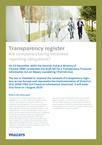
Transparency register: Are companies facing extended reporting obligations?
The law is intended to improve the network of transparency registers across Europe and represents the implementation of Directive (EU) 2019/1153 (EU Financial Information Directive). It will enter into force on 1 August 2021.
What is the status quo?
The current form of the transparency register is designed as a so-called “catch-all” register which collects information on companies that is not contained in other registers. Thus, it only contains entries and data that are not already recorded in other registers such as the commercial register. This is based on the “fiction of notification” pursuant to section 20 (2) of the German Anti-Money-Laundering Act (GwG), according to which the obligation of notification is generally deemed to have been fulfilled if beneficial owners can be identified from other registers (e.g. register of cooperatives or also register of associations). For the majority of German companies, therefore, there are no data records in the existing transparency register.
Due to this lack of uniformity, the current transparency register is therefore not suitable for a Europe-wide network, as structured and uniform data records on beneficial owners are required for this purpose. The transparency register is thus to be converted to a complete register.
What does the new regulation provide for?
Originally, the transparency registers of the EU member states were to be interconnected by March 10, 2021. Now, however, the draft bill for the TraFinG Gw provides for a later date in August. The amendment of the transparency register means the change from a “catch-all register” to a complete register. In the course of this, the “fiction of notification” in section 20 (2) GwG is to be abolished. From now on, all companies will be obliged, when the law comes into force, not only to identify their beneficial owner, but also to notify the transparency register for registration. Likewise, the companies themselves are responsible for ensuring that their data is correct and up to date.
Other planned changes:
In the future, the place of birth and all nationalities will also be part of the data that must be reported (section 19 (1) GwG n.v.).
Foreign associations must make entries if shares in a company with property within the meaning of Section 1 of the German Income Tax Act (section 20 (1) sentence 2 of the GwG, n. v.) are transferred to them.
By when must companies have notified the beneficial owners at the latest?
The transitional periods for the obligation of notification for registration are regulated in section 59 (7) GwG n.v. as follows:
- AG, SE, KGaA until 31.3.2022
- GmbH, Partnerschaftsgesellschaft, Genossenschaft, Europäische Genossenschaft until 30.6.2022
- In all other cases by 31.12.2022 at the latest
What happens if companies do not comply with their obligation of reporting?
If a company does not comply with its obligation of reporting by the date applicable to it, it is deemed to have commited an administrative offense and must expect a fine pursuant to section 56 (1) No. 54 et seq. GwG. In the case of reckless violations, fines of up to €100,000.00 may be imposed; in the case of more serious violations, fines of up to €1 million or twice the amount of the benefit derived from the violation may be imposed.
In addition, the fines imposed as well as their addressees are published on the website of the Federal Office of Administration. The list is freely accessible and can be viewed here.

